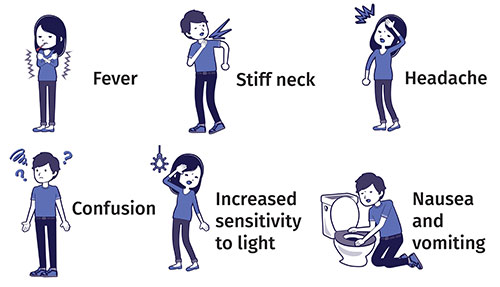Meningococcal disease is a serious bacterial infection caused by Neisseria meningitidis. It can lead to meningitis (inflammation of the protective membranes covering the brain and spinal cord) and septicemia (blood poisoning). The disease can progress rapidly and can be fatal if not treated promptly. Here’s an overview of its symptoms, causes, treatment, and prevention:
Symptoms:
- Sudden onset of high fever
- Severe headache
- Stiff neck
- Nausea and vomiting
- Sensitivity to light
- Altered mental status or confusion
- Rash (in some cases)
Causes:
- Meningococcal disease is caused by the bacterium Neisseria meningitidis.
- The bacteria are spread through respiratory and throat secretions, such as saliva or mucus.
- Close contact with an infected person, such as through coughing, sneezing, kissing, or sharing utensils, can transmit the bacteria.
Treatment:
- Prompt treatment with antibiotics is essential to prevent serious complications and death.
- Antibiotics are typically administered intravenously in a hospital setting.
- Supportive care may be provided to manage symptoms, such as fever and pain.
Prevention:
- Vaccination: Vaccines are available to protect against several strains of Neisseria meningitidis. Vaccination is recommended for adolescents, college students living in dormitories, military recruits, travelers to areas where meningococcal disease is common, and individuals with certain medical conditions.
- Hygiene: Practicing good hygiene, such as washing hands frequently and avoiding close contact with individuals who are sick, can help prevent the spread of the bacteria.
- Prophylactic antibiotics: Close contacts of someone diagnosed with meningococcal disease may be prescribed antibiotics to prevent infection.

































